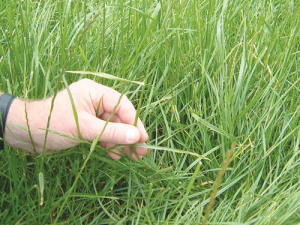More farmers renewing pasture – still more to go
Renewing 10% of New Zealand farm pasture annually would ensure productivity and performance gains achieved via new species do not dwindle over a 10-year cycle.
 Pasture renewal rates throughout NZ are very low – at around 2.5% for sheep and beef farms and only 8% for dairy farms.
Pasture renewal rates throughout NZ are very low – at around 2.5% for sheep and beef farms and only 8% for dairy farms.
Despite plenty of evidence showing the clear benefits of renewing pastures, renewal rates in New Zealand remain very low, claims the Pasture Renewal Charitable Trust.
“Pasture renewal rates nationwide are very low – around 2.5% for sheep and beef farms and only 8% for dairy farms,” says the trust’s project manager Tim Wood.
“Yet there are plenty of reasons and evidence available to suggest it is beneficial to renew older pastures.”
Wood says though research shows many farmers know the benefit of planting new pastures, many perceive barriers, including: it is expensive; new grasses don’t persist; they need greater maintenance; it is too hard (to take paddocks out of production/difficult to fit into current farm management etc); and planting new pastures is an ‘intensive’ farming practice unattractive to farmers who regard themselves as running low input farming systems.
“The end result is that some farmers may appreciate the benefits, but do not have the knowledge or confidence to give it a go,” Wood says. “However, done properly the risks are minimised.”
He says there is a big difference between a farm’s poorest producing pastures and its best paddock. “That difference in dry matter production will be having an impact on your bottom line.”
He says modern forage cultivars have been bred to improve productivity and offer benefits such as: they establish quickly; produce more dry matter per hectare; resist pests and disease better; are more palatable, making them easier to manage; have a higher feed value (ME) so stock do better; grow more feed than weed grasses in winter and summer conditions; and are a variety of cultivars bred for specific conditions to suit every farm type and operation.
Wood says replacing poor-producing paddocks with new pasture is profitable, and “one of the simplest ways to invest onfarm for a significant and relatively predictable return”.
He adds that the higher a farm’s performance, the more it can gain from intensifying its pasture renewal.
“But the benefits of pasture renewal are easily achieved in any sort of farming operation. Pasture renewal is not just a ‘high input’ farming practice; it can be incorporated into any farm management programme. And the benefits are obtainable on all grazing-based enterprises.”
The National Wild Goat Hunting Competition has removed 33,418 wild goats over the past three years.
New Zealand needs a new healthcare model to address rising rates of obesity in rural communities, with the current system leaving many patients unable to access effective treatment or long-term support, warn GPs.
Southland farmers are being urged to put safety first, following a spike in tip offs about risky handling of wind-damaged trees
Third-generation Ashburton dairy farmers TJ and Mark Stewart are no strangers to adapting and evolving.
When American retail giant Cosco came to audit Open Country Dairy’s new butter plant at the Waharoa site and give the green light to supply their American stores, they allowed themselves a week for the exercise.
Fonterra chair Peter McBride says the divestment of Mainland Group is their last significant asset sale and signals the end of structural changes.